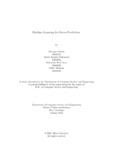| dc.contributor.advisor | Rasel, Mr. Annajiat Alim | |
| dc.contributor.author | Salehin, Sherajus | |
| dc.contributor.author | Mahmood, Syeda Tanjima | |
| dc.contributor.author | Ayon, Muhtasim Fuad | |
| dc.contributor.author | Rahman, Nafiur | |
| dc.date.accessioned | 2023-08-13T06:52:05Z | |
| dc.date.available | 2023-08-13T06:52:05Z | |
| dc.date.copyright | 2023 | |
| dc.date.issued | 2023-01 | |
| dc.identifier.other | ID: 19101311 | |
| dc.identifier.other | ID: 18101165 | |
| dc.identifier.other | ID: 18101698 | |
| dc.identifier.other | ID: 18101366 | |
| dc.identifier.uri | http://hdl.handle.net/10361/19386 | |
| dc.description | This thesis is submitted in partial fulfillment of the requirements for the degree of Bachelor of Science in Computer Science, 2023. | en_US |
| dc.description | Cataloged from PDF version of thesis. | |
| dc.description | Includes bibliographical references (pages 27-28). | |
| dc.description.abstract | Emotional, psychological, and social well-being are all part of mental health. Stress,
social anxiety, depression, and personality disorders are just a few of the elements
that build up mental health issues that lead to mental illness. Mental illness is
at an all-time high in today’s fast-paced world, and it’s on the rise. Early detec tion of mental disorders is critical for preventing mental illness and maintaining a
balanced life. Machine Learning (ML) may open up new avenues for recognizing
human behavior patterns, as well as detecting irregular mental health symptoms
and risk factors. This study gives a systematic view of machine learning approaches
to mental health problem prediction. We scan credible resources for research ar ticles and studies relating to machine learning methodologies in predicting mental
illness. Machine learning is used in various ways to anticipate mental illness and
respond accordingly. Machine learning methods and approaches will aid in the pre diction of mental illnesses. To summarize, this thesis attempts to have an impact
on the healthcare industry by using machine learning approaches to detect mentally
ill patients using large data. We will collect data from the internet through Google
form, pre-process the data and use machine learning algorithms to make a model
that will predict stress from our selected features. This research work proposes to
experiment with various machine learning algorithms (for example scatter matrix
plots, decision trees, and logistic regression), compare their performance, and final ize a model to identify the state of mental health status from an organized dataset. | en_US |
| dc.description.statementofresponsibility | Sherajus Salehin | |
| dc.description.statementofresponsibility | Syeda Tanjima Mahmood | |
| dc.description.statementofresponsibility | Muhtasim Fuad Ayon | |
| dc.description.statementofresponsibility | Nafiur Rahman | |
| dc.format.extent | 28 pages | |
| dc.language.iso | en | en_US |
| dc.publisher | Brac University | en_US |
| dc.rights | Brac University theses are protected by copyright. They may be viewed from this source for any purpose, but reproduction or distribution in any format is prohibited without written permission. | |
| dc.subject | Machine learning | en_US |
| dc.subject | Prediction | en_US |
| dc.subject | Decision tree | en_US |
| dc.subject | Linear regression | en_US |
| dc.subject | Analysis | en_US |
| dc.subject | Mental | en_US |
| dc.subject | Stress | en_US |
| dc.subject | Anxiety | en_US |
| dc.subject | Depression | en_US |
| dc.subject.lcsh | Strains and stresses. | |
| dc.subject.lcsh | Machine learning | |
| dc.title | Machine learning for stress prediction | en_US |
| dc.type | Thesis | en_US |
| dc.contributor.department | Department of Computer Science and Engineering, Brac University | |
| dc.description.degree | B. Computer Science | |

